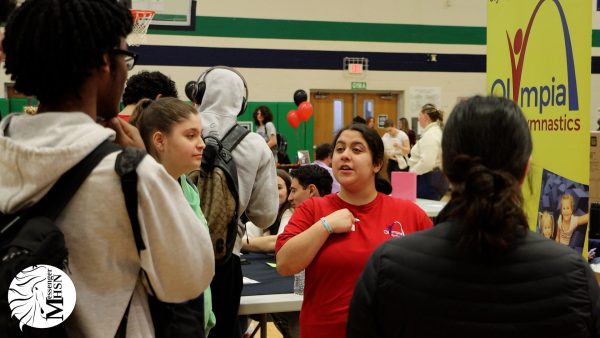Missouri Model Addresses Trauma and Stress in Schools
For More News...
Media by Alayna Higdon
Students from Mustangs for Mental Health listen to a presentation about suicide awareness.
Dr. Terry Harris, executive director of student services at RSD, helped create a new model to be implemented in Missouri schools to help teachers and administrators be more cognizant of trauma and stress in the student body. He helped write about the model in the St. Louis Post Dispatch.
“Students have pressures inflicted on them by themselves, their parents and society,” Dr. Harris said.
The Missouri Model for Trauma-Informed Schools contains guidelines to help schools deal with trauma and help students’ mental health. This includes counseling and mental health specialists, resources for teachers and students and a mental health educational program for teachers. The model sets up a process on how to be aware of trauma among students and its effects on daily life. Dr. Harris was a member of the work group that created the model.
“School is to help kids process learning, so if kids are experiencing a high level of trauma, they can’t learn,” Dr. Harris said. “A trauma-informed school says there are people in our community hurting from second-hand trauma.”
The main goal of schools is to educate its students. If students and teachers have a poor mental state at school, education is not possible, Dr. Harris said.
With the new Missouri Model, for schools to be considered “trauma-informed,” teachers and administrators must go through a program with Alive and Well St. Louis. This program works with the community and the St. Louis Health Commission to reduce stress, trauma and anxiety by providing services to teach people to be trauma-informed and help understand mental illness and struggles.
Jeff Marx, guidance counselor, said the Missouri Model for Trauma-Informed Schools will give schools and administrators a framework of the best ways to respond to trauma and students mental health needs.
“Stress can affect a student’s performance academically, their ability to learn and their general wellbeing,” Marx said. “Feeling safe and cared for in your environment are key to having the mental focus to be able to learn.”
Mustangs for Mental Health (M4MH) is one of the clubs that works to educate about mental health. Annie Getts, senior, is the Communications Officer for M4MH.
M4MH works to end the stigma around mental health through advocacy and education, like the MHS Wellness Day, and posters and drawings for National Suicide Prevention Day.
“Your state of mind will affect every aspect of your everyday life,” Getts said.
Getts said the emphasis on mental health and current education within the curriculum is insufficient. The new model hopes to address these flaws by implementing a program with the St. Louis Health Commission. “Mental illnesses deserve the same attention, care and response that physical illnesses receive,” Getts said.
Your donation will support the student journalists of Marquette High School. Your contribution will allow us to purchase equipment and cover our annual website hosting costs. You may become a PATRON by making a donation at one of these levels: White/$30, Green/$50, Blue/$100. Patron names will be published in the print newsmagazine, on the website and once per quarter on our social media accounts.

Alayna Higdon, senior, is a staff reporter for the Messenger. This year, she will serve as Mock Trial co-president. She also participates in Politics Club,...




